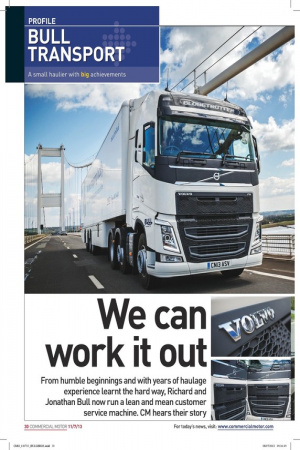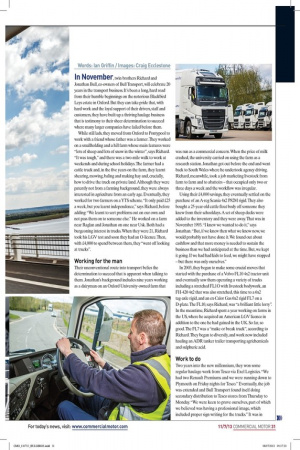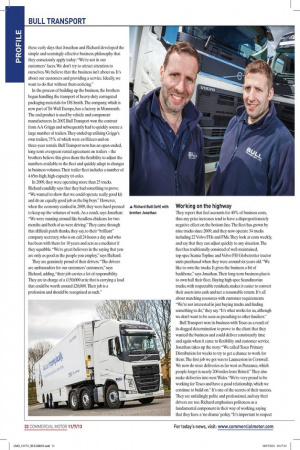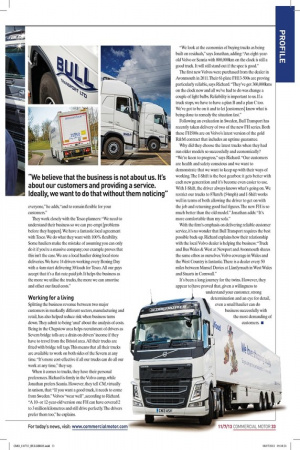PROFILE BULL TRANSPORT A small haulier with achievements We can
Page 25

Page 26

Page 27

Page 28

If you've noticed an error in this article please click here to report it so we can fix it.
work it out From humble beginnings and with years of haulage experience learnt the hard way, Richard and Jonathan Bull now run a lean and mean customer service machine. CM hears their story Words: Ian Griffin / Images: Craig Ecctestone In November, twin brothers Richard and Jonathan Bull, co-owners of Bull Transport, will celebrate 20 years in the transport business. It's been a long, hard road from their humble beginnings on the notorious Blackbird Leys estate in Oxford. But they can take pride that, with hard work and the loyal support of their drivers, staff and customers, they have built up a thriving haulage business that is testimony to their sheer determination to succeed where many larger companies have failed before them.
While still lads, they moved from Oxford to Pontypool to work with a friend whose father was a fanner. They worked on a smallholding and a hill farm whose main features were "lots of sheep and lots of snow in the winter", says Richard. "It was tough," and there was a two-mile walk to work at weekends and during school holidays. The farmer had a cattle truck and, in the five years on the farm, they learnt shearing, mowing, baling and making hay and, crucially, how to drive the truck on private land. Although they were patently not from a farming background, they were always interested in agriculture from an early age. Eventually, they worked for two farmers on a YTS scheme. "It only paid £25 a week, but you learnt independence," says Richard, before adding: "We learnt to sort problems out on our own and not pass them on to someone else." He worked on a farm near Raglan and Jonathan on one near Usk. Both had a burgeoning interest in trucks. When they were 21, Richard took his LGV test and soon they had an 0-licence. Then, with £4,000 to spend between them, they "went off looking at trucks".
Working for the man Their unconventional route into transport belies the determination to succeed that is apparent when talking to them. Jonathan's background includes nine years working as a dairyman on an Oxford University-owned farm that was run as a commercial concern. When the price of milk crashed, the university carried on using the farm as a research station. Jonathan got out before the end and went back to South Wales where he undertook agency driving. Richard, meanwhile, took a job marketing livestock from farm to farm and to abattoirs — that occupied only two or three days a week and the workflow was irregular.
Using their £4,000 savings, they eventually settled on the purchase of an A-reg Scania 4x2 P82M rigid. They also bought a 25-year-old cattle float body off someone they knew from their schooldays. A set of sheep decks were added to the inventory and they were away. That was in November 1993. "I knew we wanted to do it," says Jonathan. "But, if we knew then what we know now, we would probably not have done it. We found out about cashflow and that more money is needed to sustain the business than we had anticipated at the time. But, we kept it going. If we had had kids to feed, we might have stopped — but there was only ourselves."
In 2003, they began to make some crucial moves that started with the purchase of a Volvo FL10 4x2 tractor unit and eventually saw them operating a variety of trucks including a stretched FL10 with livestock bodywork, an FH-420 4x2 that was also stretched, this time to a 6x2 tag-axle rigid, and an ex-Calor Gas 6x2 rigid FL7 on a D-plate. The FL10, says Richard, was "a brilliant little lorry': In the meantime, Richard spent a year working on farms in the US, where he acquired an American LGV licence in addition to the one he had gained in the UK. So far, so good. The FL7 was a "make or break truck", according to Richard. They began to diversify, and work now included hauling an ADR tanker trailer transporting agrichemicals and sulphuric acid.
Work to do Two years into the new millennium, they won some regular haulage work from Tesco via Exel Logistics. "We had two Renault Premiums and we were running down to Plymouth on Friday nights for Tesco." Eventually, the job was extended and Bull Transport found itself doing secondary distribution to Tesco stores from Thursday to Monday. "We were keen to prove ourselves, part of which we believed was having a professional image, which included proper sign writing for the trucks." It was in these early days that Jonathan and Richard developed the simple and seemingly effective business philosophy that they consciously apply today: "We're not in our customers' faces. We don't try to attract attention to ourselves. We believe that the business isn't about us. It's about our customers and providing a service. Ideally, we want to do that without them noticing."
In the process of building up the business, the brothers began handling the transport of heavy-duty corrugated packaging materials for DS Smith. The company, which is now part of Tr-Wall Europe, has a factory in Monmouth. The end product is used by vehicle and component manufacturers. In 2007, Bull Transport won the contract from AA Griggs and subsequently had to quickly source a large number of trailers. They ended up utilising Griggs's own trailers, 75% of which were ex-Hireco and on three-year rentals. Bull Transport now has an open-ended, long-term evergreen rental agreement on trailers — the brothers believe this gives them the flexibility to adjust the numbers available to the fleet and quickly adapt to changes in business volumes. Their trailer fleet includes a number of 4.65m-high, high-capacity tri-axles.
In 2009, they were operating more than 25 trucks. Richard candidly says that they had something to prove: "We wanted to show that we could operate really good kit and do an equally good job as the big boys." However, when the economy crashed in 2009, they were hard-pressed to keep up the volumes of work. As a result, says Jonathan: brother Jonathan "We were running around like headless chickens for two months and both of us were driving." They came through that difficult patch thanks, they say, to their "brilliant" company secretary, who is on call 24 hours a day and who has been with them for 10 years and acts as a mediator if they squabble. "We're great believers in the saying that you are only as good as the people you employ," says Richard.
They are genuinely proud of their drivers. "The drivers are ambassadors for our customers' customers," says Richard, adding, "their job carries a lot of responsibility.
They are in charge of a £150,000 artic that is carrying a load that could be worth around £20,000. Their job is a profession and should be recognised as such." A Richard Bull (left) with Working on the highway They report that fuel accounts for 40% of business costs, thus any price increases tend to have a disproportionately negative effect on the bottom line. The fleet has grown by nine trucks since 2009, and they now operate 34 trucks including 22 Volvo PHs and FMs. They look at costs weekly, and say that they can adjust quickly to any situation. The fleet has traditionally consisted of well-maintained, top-spec Scania Topline and Volvo FH Globetrotter tractor units purchased when they were around six years old. "We like to own the trucks. It gives the business a bit of backbone," says Jonathan. Their long-term business plan is to own half their fleet. Buying high-spec Scandinavian trucks, with respectable residuals, makes it easier to convert their assets into cash and net a reasonable return. It's all about matching resources with customer requirements. "We're not interested in just buying trucks and finding something to do," they say. "It's what works for us, although we don't want to be seen as preaching to other hauliers."
Bull Transport won its business with Tesco as a result of its dogged determination to prove to the client that they wanted the business and could deliver consistently time and again when it came to flexibility and customer service. Jonathan takes up the story: "We called Tesco Primary Distribution for weeks to try to get a chance to work for them. The first job we got was to Launceston in Cornwall. We now do store deliveries as far west as Penzance, which people forget is nearly 200 miles from Bristol." They also make deliveries into west Wales. "We're very proud to be working for Tesco and have a good relationship, which we continue to build on." It's one of the secrets of their success. They are unfailingly polite and professional, and say their drivers are too. Richard emphasises politeness as a fundamental component in their way of working, saying that they have a 'no drama' policy. "It's important to respect everyone," he adds, "and to remain flexible for your customers."
They work closely with the Tesco planners: "We need to understand their business so we can pre-empt [problems before they happen].We have a fantastic local agreement with Tesco. We do what they want with 100% flexibility. Some hauliers make the mistake of assuming you can only do it if you're a massive company; our example proves that this isn't the case. We are a local haulier doing local store deliveries. We have 14 drivers working every Boxing Day with a 4am start delivering 30 loads for Tesco. All our guys accept that it's a flat-rate paid job. It helps the business as the more we utilise the trucks, the more we can amortise and offset our fixed costs."
Working for a living Splitting the business revenue between two major customers in markedly different sectors, manufacturing and retail, has also helped reduce risk when business turns down. They admit to being 'anal' about the analysis of costs. Being in the Chepstow area helps recruitment of drivers as Severn bridge tolls are a drain on drivers' income if they have to travel from the Bristol area. All their trucks are fitted with bridge toll tags. This means that all their trucks are available to work on both sides of the Severn at any time. "It's more cost-effective if all our trucks can do all our work at any time," they say.
When it comes to trucks, they have their personal preferences. Richard is firmly in the Volvo camp, while Jonathan prefers Scania. However, they tell CM, virtually in unison, that: "If you want a good truck, it needs to come from Sweden." Volvos "wear well", according to Richard. "A 10or 12-year-old version one FH can have covered 2 to 3 million kilometres and still drive perfectly. The drivers prefer them too," he explains. "We look at the economics of buying trucks as being built on residuals," says Jonathan, adding: "An eight-yearold Volvo or Scania with 800,000km on the clock is still a good truck. It will still stand out if the spec is good."
The first new Volvos were purchased from the dealer in Avonmouth in 2011. Their 61-plate FH13-500s are proving particularly reliable, says Richard. "They've got 360,000kms on the clock now and all we've had to do was change a couple of light bulbs. Reliability is important to us. If a truck stops, we have to have a plan B and a plan C too. We've got to be on it and to let [customers] know what is being done to remedy the situation fast."
Following an evaluation in Sweden, Bull Transport has recently taken delivery of two of the new FH series. Both these FH500s are on Volvo's latest version of the gold R&M contract that includes an uptime guarantee.
Why did they choose the latest trucks when they had run older models so successfully and economically? "We're keen to progress," says Richard. "Our customers are health and safety conscious and we want to demonstrate that we want to keep up with their ways of working. The I-Shift is the best gearbox: it gets better with each new generation and it's become even easier to use. With I-Shift, the driver always knows what's going on. We restrict our trucks to 87km/h (54mph) and I-Shift works well in terms of both allowing the driver to get on with the job and returning good fuel figures. The new FH is so much better than the old model." Jonathan adds: "It's more comfortable than my sofa."
With the firm's emphasis on delivering reliable customer service, it's no wonder that Bull Transport requires the best possible back-up. Richard explains how their relationship with the local Volvo dealer is helping the business: "Truck and Bus Wales & West at Newport and Avonmouth shares the same ethos as ourselves. Volvo coverage in Wales and the West Country is fantastic. There is a dealer every 50 miles between Mansel Davies at Llanfyrnach in West Wales and Stuarts in Cornwall."
It's been a long journey for the twins. However, they appear tol have proved that, given a willingness to understand your customer, strong 'determination and an eye for detail, even a small haulier can do business successfully with the most demanding of customers. •










































